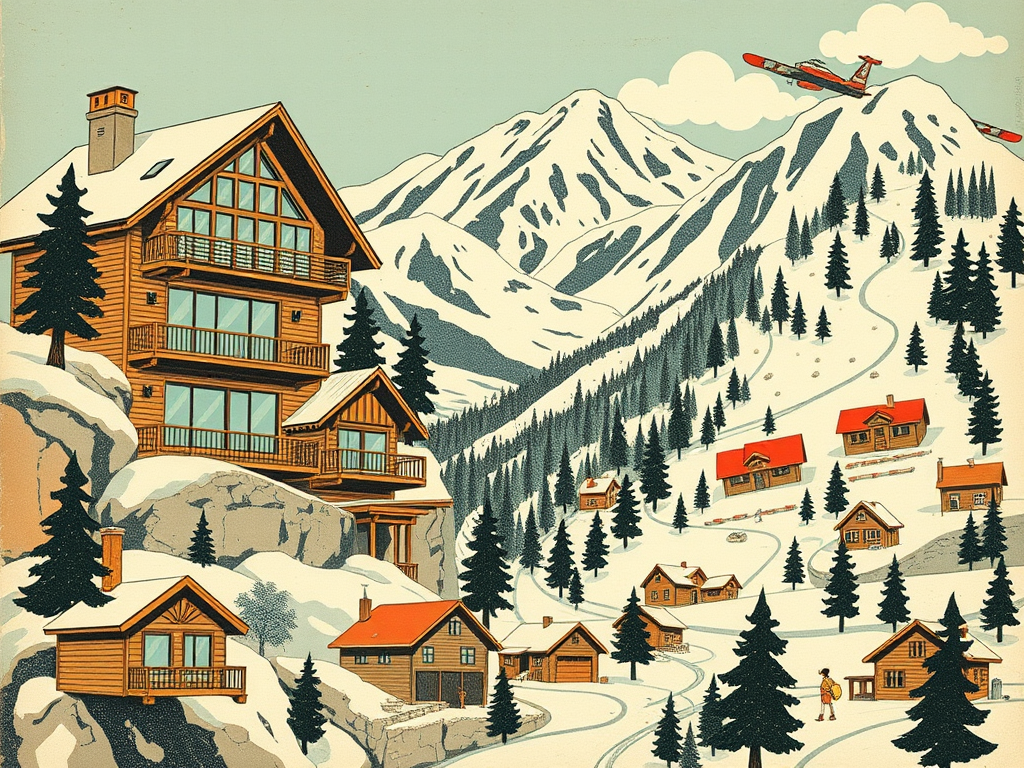
Ski Resort Property: Greece’s Mountain Homes vs. Alpine Investments
Reading time: 15 minutes
Table of Contents
- Introduction
- Greece’s Emerging Ski Resort Market
- Traditional Alpine Ski Destinations
- Comparative Analysis
- Investment Considerations
- Market Trends and Future Outlook
- Conclusion
- FAQs
Introduction
As the global real estate market continues to evolve, investors and homebuyers are increasingly looking beyond traditional options to find unique opportunities. One such emerging trend is the comparison between Greece’s burgeoning mountain home market and the well-established Alpine ski resort properties. This comprehensive analysis will delve into the nuances of both markets, offering data-driven insights and expert perspectives on this intriguing economic landscape.
The ski resort property sector has long been dominated by iconic Alpine destinations in countries like Switzerland, France, and Austria. However, Greece, a country traditionally associated with sun-soaked islands and coastal retreats, is making surprising inroads into the winter sports real estate market. This shift presents a fascinating case study in economic diversification and market adaptation.
Greece’s Emerging Ski Resort Market
Greece’s foray into the ski resort property market is a relatively recent phenomenon, but one that’s gaining momentum rapidly. The country’s mountainous terrain, particularly in regions like Macedonia, Epirus, and the Peloponnese, offers untapped potential for winter sports enthusiasts and investors alike.
Key Greek Ski Destinations
Several Greek ski resorts are leading the charge in this emerging market:
- Parnassos Ski Center: Located just a few hours from Athens, this resort is becoming a hotspot for both local and international property buyers.
- Kalavryta Ski Resort: Situated in the Peloponnese, this resort combines skiing opportunities with proximity to historical sites.
- Vasilitsa Ski Resort: Nestled in the Pindus Mountains, this resort offers a more secluded, off-the-beaten-path experience.
These destinations are not just attracting ski enthusiasts; they’re also drawing investors looking for unique property opportunities. The appeal lies in the combination of winter sports facilities and the chance to experience Greece’s rich cultural heritage.
Market Data and Trends
Recent data indicates a growing interest in Greek mountain properties:
- Property prices in Greek ski resort areas have seen an average annual increase of 5-7% over the past three years.
- Foreign investment in Greek mountain real estate has grown by 15% since 2018.
- The number of visitors to Greek ski resorts has increased by 20% in the last winter season, indicating rising popularity.
These figures suggest a market in its growth phase, offering potential for early investors to capitalize on rising property values and increasing tourism demand.
Traditional Alpine Ski Destinations
The Alpine region, spanning across France, Switzerland, Austria, and Italy, has long been the gold standard for ski resort properties. These destinations offer a combination of world-class skiing, luxury amenities, and a proven track record of property value appreciation.
Established Alpine Markets
Key Alpine ski resort areas include:
- Courchevel, France: Known for its ultra-luxury properties and celebrity clientele.
- Verbier, Switzerland: A favorite among international investors for its stable property market.
- Kitzbühel, Austria: Combines traditional charm with modern amenities, attracting a diverse range of buyers.
These destinations have consistently demonstrated strong property value retention and growth, making them attractive to risk-averse investors.
Alpine Market Dynamics
The Alpine ski resort property market is characterized by:
- High entry costs, with prime properties often exceeding €10,000 per square meter.
- Strong rental yields, particularly in high-end resorts, often reaching 3-5% annually.
- A mature market with limited new development opportunities, leading to steady appreciation of existing properties.
The Alpine market’s stability is both its strength and potential weakness, as it may offer fewer opportunities for dramatic value increases compared to emerging markets.
Comparative Analysis
When comparing Greek mountain homes to Alpine investments, several key factors come into play:
Price Points and Affordability
Greek mountain properties generally offer a more accessible entry point for investors:
- Average price per square meter in Greek ski resorts: €2,000 – €4,000
- Average price per square meter in prime Alpine resorts: €8,000 – €15,000
This significant price difference makes Greek properties attractive to a broader range of investors and second-home buyers.
Rental Yield Potential
While Alpine properties have a proven track record of strong rental yields, Greek mountain homes are showing promising potential:
- Greek ski resort rental yields: 4-6% (projected)
- Alpine ski resort rental yields: 3-5% (established)
The higher projected yields in Greece are partly due to lower property costs and increasing tourism interest.
Market Maturity and Growth Potential
The contrasting market maturities offer different advantages:
- Greek market: Higher growth potential, but with associated risks of an emerging market.
- Alpine market: Stable returns, but potentially limited room for significant value appreciation.
Investors must weigh the potential for higher returns against the stability and proven performance of established markets.
Investment Considerations
When evaluating ski resort property investments in Greece versus the Alps, several key factors should be considered:
Legal and Regulatory Environment
Greece has been working to streamline its property purchasing process for foreign investors. The introduction of the greek residence permit program has made it easier for non-EU citizens to invest in Greek real estate. However, the Alpine countries generally have more established and transparent property markets, which can be reassuring for international investors.
Infrastructure and Accessibility
Alpine resorts typically boast superior infrastructure, both in terms of ski facilities and general amenities. Greek resorts are catching up, with significant investments being made in modernizing ski lifts and expanding resort facilities. However, accessibility can still be a challenge for some Greek mountain destinations compared to their well-connected Alpine counterparts.
Season Length and Climate Considerations
Climate change is a significant factor in ski resort investments:
- Alpine resorts: Generally have longer seasons and more reliable snowfall, but are facing challenges due to rising temperatures.
- Greek resorts: Shorter seasons, but potentially more resilient to climate change due to higher altitudes of some resorts.
Investors should consider long-term climate projections when assessing the viability of ski resort properties.
Market Trends and Future Outlook
The ski resort property market is evolving, influenced by global economic trends, changing travel patterns, and environmental factors.
Emerging Trends
- Increasing interest in year-round mountain destinations, not just winter sports.
- Growing demand for eco-friendly and sustainable resort developments.
- Rise of remote work leading to longer stays and increased interest in mountain home ownership.
Future Projections
For Greek mountain properties:
- Projected annual growth in property values: 7-10% over the next five years.
- Expected increase in foreign investment by 25% by 2025.
- Planned infrastructure improvements valued at €500 million across major Greek ski resorts.
For Alpine properties:
- Stable growth projections of 3-5% annually.
- Continued strong demand from high-net-worth individuals and institutional investors.
- Increasing focus on luxury amenities and exclusive experiences to maintain competitive edge.
Conclusion
The comparison between Greek mountain homes and Alpine ski resort investments presents a fascinating study in contrasting market dynamics. While Alpine properties offer stability, prestige, and proven returns, Greek mountain homes represent an emerging opportunity with potentially higher growth prospects and more accessible price points.
Investors must carefully weigh their risk tolerance, investment goals, and long-term market outlook. The Greek market offers exciting potential for those willing to embrace a developing market, while Alpine properties continue to be a solid choice for those seeking established luxury and reliable returns.
Ultimately, the choice between these two markets will depend on individual investor profiles and perspectives on future market trends. As with any real estate investment, thorough due diligence, consideration of broader economic indicators, and a clear understanding of personal investment objectives are crucial.
The ski resort property market, whether in Greece or the Alps, continues to evolve, offering diverse opportunities for astute investors. As global travel patterns shift and remote work becomes more prevalent, mountain homes in both regions are likely to see sustained interest, albeit with different growth trajectories and risk profiles.
FAQs
1. What are the main advantages of investing in Greek mountain properties over Alpine ski resorts?
Greek mountain properties offer lower entry costs, potentially higher rental yields, and greater room for value appreciation due to the emerging nature of the market. They also provide a unique blend of winter sports and Mediterranean culture.
2. How does climate change impact ski resort property investments?
Climate change poses risks to ski resort properties by potentially shortening ski seasons and reducing snowfall. However, higher altitude resorts and those investing in snow-making technology may be more resilient. Diversification into year-round activities is becoming increasingly important.
3. What legal considerations should foreign investors be aware of when purchasing ski resort properties in Greece?
Foreign investors should be aware of Greece’s property purchase process, which has been streamlined in recent years. The Greek residence permit program offers additional benefits for non-EU investors. It’s advisable to work with local legal experts to navigate the process smoothly.
4. Are there any tax implications to consider when investing in ski resort properties in Greece versus the Alps?
Tax implications vary significantly between countries. Greece has recently introduced favorable tax rates for foreign retirees and investors. Alpine countries generally have higher property and income tax rates but offer stable and transparent tax systems. Consulting with a tax professional is crucial for understanding the specific implications in each location.
5. How does the rental market differ between Greek and Alpine ski resorts?
Alpine ski resorts typically have a more established rental market with a longer season and higher-paying clientele. Greek ski resorts are seeing growing rental demand but may have shorter seasons. However, Greek properties often offer the potential for year-round rentals due to their appeal in both winter and summer months.

Article reviewed by Charlotte Bennett, Senior Corporate Strategist | Mentor to Next-Gen Leaders | Navigating Business Transitions, on March 14, 2025
